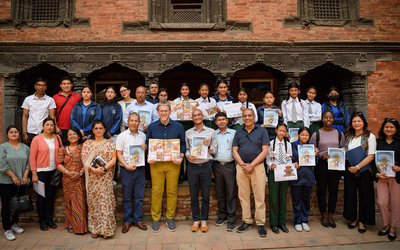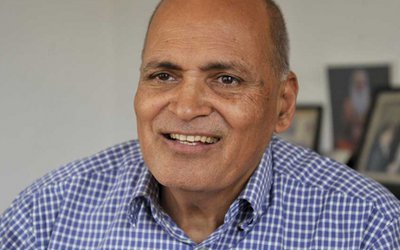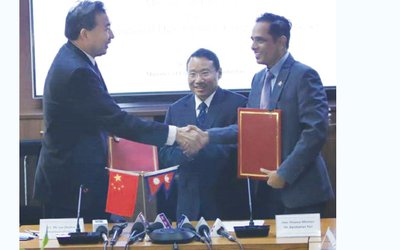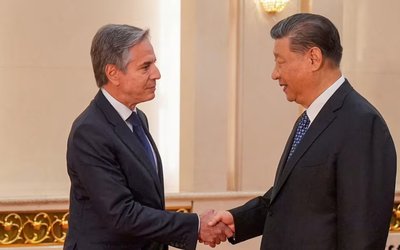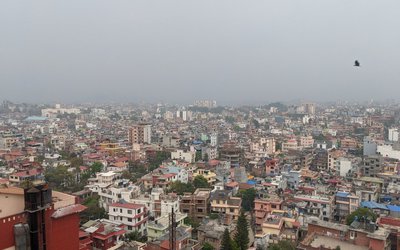
With the fencing of Nepal-India border in eastern Nepal with solar electric wires, the entry of wild elephants from India to Nepal stopped. Failing to enter Nepal, angry elephants went about causing rampant destruction on the other side of the border.
Annually elephants from the Brahamputra basin of the Indian state of Assam march to Nepal’s Kosi River for swimming. As the population continues to migrate, with the plan of clearing the forests for the settlement on the road of elephants, there appears the conflict. Rhinos and tigers of Chitwan National Park, Bardia National Park move to each other's countries regularly.
Similarly, Nepal’s mighty rivers, which originate in the Himalayas, fall to the plains of India before submerging to sea. The rivers and animals create the road they wish. Similarly, Nepal and India share religion and culture as no two countries in the world do.
As rivers flow, wild animals move and people march from one place to the other freely to perform their religious practices. Although there are so many connecting factors in Nepal-India relations and overwhelming number of people have made no complaints at all, a section of people in the political sector continue to harp on slogans for the political benefits in Nepal.
As Nepal’s communist parties continue to thrive by exploiting Nepal’s relations with India, ignoring human, geographical, cultural and religious realities of Nepal and India. The idea to form the committee was also proposed during the tenure of the communist led government.
“Nepal and India have been enjoying the best of relations from time immemorial. The relationships date back to the pre-historic period, rooted in the way of life of our two peoples. We are linked by the same profile of geography that begins from the high Himalayas and runs down to the Ganges plain. We share history and civilization,” said deputy prime minister and minister of foreign affairs Kamal Thapa highlighting the importance of the relations.
Similarly, senior leader of BJP and co-chair of EPG Bhagat Singh Koshyari said India-Nepal relations have some unique patterns. “Our relations are pure as the Ganga River. We share the same geography, religion and culture. Pashupatnath of Kathmandu, Badrinath of India, Muktinath of Gandaki and Biswonath of Benaras are our common religious sites. I have the right to visit Pashupati and Mukitnath or Janakpur and you too have the right to visit all the shrines in India,” said Koshyari.
Although Deputy Prime Minister Thapa started his statement highlighting the importance of relations, he concluded his second part of the statement focusing on modern statecraft rather than the value of the reality of nature, religion and culture.
However, Koshyari expressed realistic views highlighting importance of nature, religion and culture of two countries as the foundation of bilateral relations.
With the growing pressure from communists, Nepal and India formed the Eminent Persons Group to discuss and review Nepal-India Relations. As any treaty or agreement needs to be ratify through two thirds of majority in the Legislature Parliament, one can understand the consequence of the absence of Nepali Congress leaders and Madhesh based parties in the program. As any new treaty and understanding with India will have direct impact on the livelihood of Madheshi people, no discussion will materialize without their participation and involvement.
Headed by two senior personalities, the first meeting of EPG on Nepal-India Relations concluded in Nepal agreeing to discuss the whole gamut of relations in the present context.
As the Indian team was composed of senior leader of BJP Bhagat Singh Koshyari, seasoned diplomat and former Indian ambassador to Nepal Jayant Prasad, academicians and security experts Mahendra P. Lama and Professor Dr. B.C. Upreti, it was a diverse and mixed blend with politicians, diplomats and experts.
So far as Nepal’s EPG team is concerned; Nepal side was composed of persons loaded with anti-Indian views and affiliated with one political ideology. Except co-chair Dr. Bhekh Bahadur Thapa, a veteran diplomat with his own standing, two members Nilamber Acharya and Surya Nath Upadhyaya are known for their communist leaning and loaded views on the treaties and relations with India. Dr. Rajan Bhattarai himself is a member of CPN-UML, which is known for its stand on India.
Given the nature of the Nepalese team, the question is: does EPG represent broader views of Nepalese people and reality of Nepal-India relations? The selection of people itself tells the story.
Then what is the use of it? “It is good to listen to the grievances of each other on bilateral ties on a certain level. However, the decision cannot be taken by this body and political leaders have to take the decision. Out of this, Nepal’s constitutional provision is so complex that there is the need of a two thirds majority ratification of treaty,” said Professor Dr. Lok Raj Baral. “Nepal-India relations have several dynamics as they exist at the people to people level, economic level, historical level, cultural level and security level. Rather than talking about the reality, Nepalese politicians are talking more on symbolic values,” said Professor Baral.
The two-day meeting finalized the body’s agenda, time frame, and code for its members, as well as working procedures. There was an exclusive closed-door discussion by its eight members.
As EPG groups of experts conclude their talk framing the basis for negotiations, tens of thousands of people, hundreds of animals and uncountable cubic meters of water might have entered India. With so many human and other dynamics, one cannot find any solution looking at Nepal-India relations on solely political dynamics.

Keshab Poudel
Poudel is the editor of New Spotlight Magazine.
- IWMI: SoLAR Global Science-Policy Forum Conference
- Apr 25, 2024
- CLA: Samriddhi For Skill Development
- Apr 23, 2024
- ECONOMY: Growth At 3.3
- Apr 16, 2024
- DPM’s SHRESTHA’S CHINA VISIT High Profile, Low Key
- Apr 14, 2024
- Maha Kumbha In Barahkshetra: A Sacred Festival In Sacred Koshi (Kaushiki) River
- Apr 09, 2024






